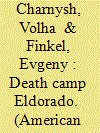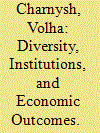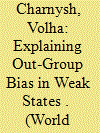| Srl | Item |
| 1 |
ID:
156705


|
|
|
|
|
| Summary/Abstract |
Transfer and redistribution of wealth accompany most violent conflicts throughout the world, yet the local-level political and economic effects of this phenomenon remain unexplored. We address this omission by examining the long-term impact on the surrounding communities of the Nazi death camp Treblinka in Poland, where nearly a million Jews were murdered. The assets of murdered Jews sometimes ended up in the hands of the local population. We are able to identify the enduring impact of these property transfers on local economic and political outcomes because the exact location of Treblinka was exogenous to the characteristics of surrounding communities. We find that communities located closer to the camp experienced a real estate boom but do not exhibit higher levels of economic and social development. These communities also showed higher support for an anti-Semitic party, the League of Polish Families. Our findings speak to an important but overlooked challenge to post-conflict reconstruction and reconciliation.
|
|
|
|
|
|
|
|
|
|
|
|
|
|
|
|
| 2 |
ID:
165420


|
|
|
|
|
| Summary/Abstract |
How does an increase in cultural diversity affect state–society interactions? Do institutional differences between heterogeneous and homogeneous communities influence economic activity? I argue that heterogeneity not only impedes informal cooperation but also increases demand for third-party enforcement provided by the state. Over time, the greater willingness of heterogeneous communities to engage with state institutions facilitates the accumulation of state capacity and, in common-interest states, promotes private economic activity. I test this argument using original data on post-WWII population transfers in Poland. I find that homogeneous migrant communities were initially more successful in providing local public goods through informal enforcement, while heterogeneous migrant communities relied on the state for the provision of public goods. Economically similar during state socialism, heterogeneous communities collected higher tax revenues and registered higher incomes and entrepreneurship rates following the transition to the market. These findings challenge the predominant view of diversity as harmful to economic development.
|
|
|
|
|
|
|
|
|
|
|
|
|
|
|
|
| 3 |
ID:
185604


|
|
|
|
|
| Summary/Abstract |
Two dominant explanations for ethnic bias in distributional outcomes are electoral incentives and out-group prejudice. This article proposes a novel and complementary explanation for the phenomenon: variation in legibility across ethnic groups. The author argues that states will allocate fewer resources to groups from which they cannot gather accurate information or collect taxes. The argument is supported by original data on state aid from the 1891/1892 famine in the Russian Empire. Qualitative and quantitative analyses show that districts with a larger Muslim population experienced higher famine mortality and received less generous public assistance. The Muslims, historically ruled via religious intermediaries, were less legible to state officials and generated lower fiscal revenues. State officials could not count on the repayment of food loans or collect tax arrears from Muslim communes, so they were more likely to withhold aid. State relief did not vary with the presence of other minorities that were more legible and generated more revenue.
|
|
|
|
|
|
|
|
|
|
|
|
|
|
|
|